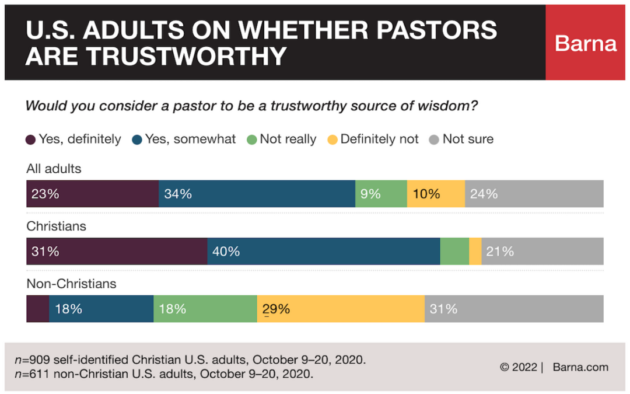Public faith in credibility of pastors eroding, survey finds
U.S. pastors have some work to do to improve their credibility with the public.
The news comes with increasing hostility towards pastors, churches, and people of faith in the media, Hollywood and culture in general. Some say it’s no doubt a contributing factor.
Fewer than half of American adults, including non-Christians, see pastors as “very reliable” when it comes to handling spiritual matters, and the share of pastors who believe the general public sees them that way is even lower, according to newly published data from Barna Research.
“Pastors are no longer perceived as a credible voice or a trustworthy source of wisdom on much,” the Rev. Glenn Packiam said. “Churches don’t have much of a role in a community unless they can provide tangible help or practical care. And people aren’t likely to turn to a church for help when facing difficulties or crises. In fact, Christianity is just one way of making meaning of this world, and it isn’t really even a respected way. For many, it is archaic and outmoded, prude and rude.”
READ: Pastors debate unplugging from online services after pandemic
“The Barna Report on ‘the credibility crisis America’s pastors are facing,’ and data from Glenn Packiam’s research and book, indicates that pastors do not have a particularly high standing outside their congregations and not a necessarily strong standing within the churches they serve,” said David Emmanuel Goatley, who directs the Office of Black Church Studies and teaches theology and Christian ministry at Duke Divinity School, and is the host of the Pilgrimages of Striving and Thriving podcast.
Packiam is a senior fellow at Barna Group and associate senior pastor at New Life Church in Colorado Springs.

When asked if pastors are a trustworthy source of wisdom, 57 percent of Americans said pastors are at least somewhat wise. However, only 23 percent of all adult Americans agree that pastors are “definitely” a “trustworthy source of wisdom.” Among Christians, the figure increases to 31 percent but drops to 4 percent among non-Christians. Larger shares agree that pastors were “somewhat” a trustworthy source of wisdom, with 40 percent of Christians agreeing to this assessment.
“Non-Christians have the strongest reaction against pastors, with 29 percent saying a pastor is ‘definitely not’ a trustworthy source of wisdom, ”Packiam said. That may be unsurprising in our present culture, but it is still telling and discouraging.”
Although a significant majority of pastors, 67 percent, are very confident that their own congregations considers them a trustworthy source of wisdom, only 21 percent express a similar level of confidence in how the general community where their church is located sees them. Another 62 percent believe the general community is only “somewhat” confident in their role as a trustworthy source of wisdom.
Packiam suggests that pastors need to examine themselves to see whether the credibility issues the profession have to do with the way they have stewarded power.
“If the mishandling of power has led to the loss of credibility, returning to the source and shape of a pastor’s authority is the way back home,” he said. “I don’t mean that we can find a way to return to a central place in our communities. But we can once again become trustworthy people when we rediscover the source and the shape of pastoral authority.”
Others say it’s part of a cultural trend.
“This report from Barna is unsurprisingly consistent with our experience with clergy and congregations,” said Mark Tidsworth, founder and team leader at Pinnacle Leadership Associates based in Chapin, South Carolina. “We’ve been witnesses to the deformation and deconstruction of the traditional paradigm of church in America in recent years, with the pandemic accelerating this process. Clearly, Christianity is growing more counter-cultural as we speak, drifting toward minority status in our larger culture.”
“There’s nothing pleasant about those numbers but also nothing particularly surprising,” said Matt Cook, assistant director at the Center for Healthy Churches based in Clemmons, North Carolina. “We’re in a profound cultural shift toward secularization in American culture. In the 19th and 20th centuries, ministers and congregations could count on their centrality to culture. Now, in most areas of the country, that’s not true. Then, in addition to secularization, you must add the fragmentation of culture. People don’t agree about what’s true or important. That obviously impacts how ministers are perceived any time we try to speak/teach/lead with any kind of authority.”
“I don’t have some simple solution to that problem, but my hunch is that the way ministers respond must begin within their own congregations,” Cook told Good Faith media. “We’re not only coming to a place where the church has less of a claim on the culture but also, perhaps, where the culture might need to have less claim on the church. I’m not talking about isolationism, just an awareness that size and significance should have less of an impact on how they shape congregational life.”
–Alan Goforth | Metro Voice






